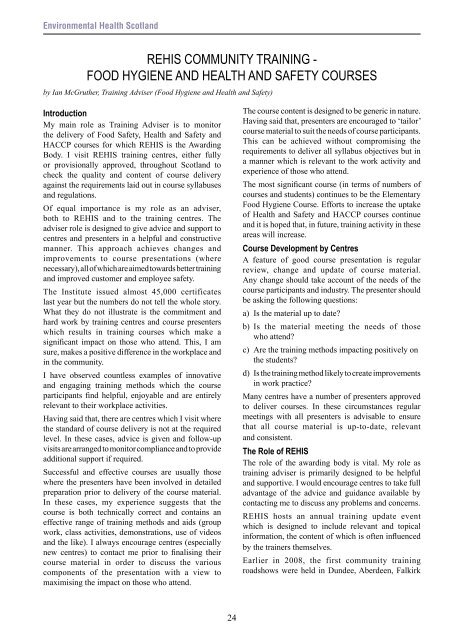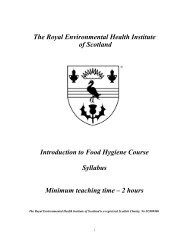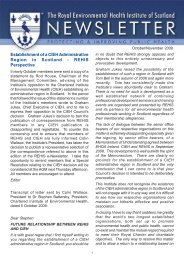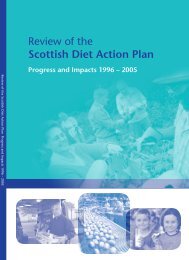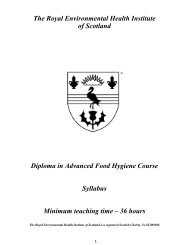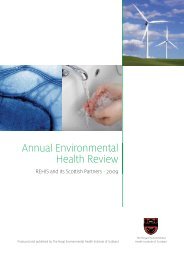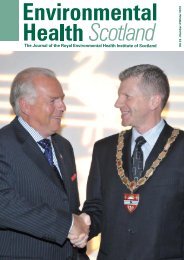Download REHIS Journal 20/2 (Summer 2008) - The Royal ...
Download REHIS Journal 20/2 (Summer 2008) - The Royal ...
Download REHIS Journal 20/2 (Summer 2008) - The Royal ...
Create successful ePaper yourself
Turn your PDF publications into a flip-book with our unique Google optimized e-Paper software.
Environmental Health Scotland<strong>REHIS</strong> COMMUNITY TRAINING -FOOD HYGIENE AND HEALTH AND SAFETY COURSESby Ian McGruther, Training Adviser (Food Hygiene and Health and Safety)IntroductionMy main role as Training Adviser is to monitorthe delivery of Food Safety, Health and Safety andHACCP courses for which <strong>REHIS</strong> is the AwardingBody. I visit <strong>REHIS</strong> training centres, either fullyor provisionally approved, throughout Scotland tocheck the quality and content of course deliveryagainst the requirements laid out in course syllabusesand regulations.Of equal importance is my role as an adviser,both to <strong>REHIS</strong> and to the training centres. <strong>The</strong>adviser role is designed to give advice and support tocentres and presenters in a helpful and constructivemanner. This approach achieves changes andimprovements to course presentations (wherenecessary), all of which are aimed towards better trainingand improved customer and employee safety.<strong>The</strong> Institute issued almost 45,000 certificateslast year but the numbers do not tell the whole story.What they do not illustrate is the commitment andhard work by training centres and course presenterswhich results in training courses which make asignificant impact on those who attend. This, I amsure, makes a positive difference in the workplace andin the community.I have observed countless examples of innovativeand engaging training methods which the courseparticipants find helpful, enjoyable and are entirelyrelevant to their workplace activities.Having said that, there are centres which I visit wherethe standard of course delivery is not at the requiredlevel. In these cases, advice is given and follow-upvisits are arranged to monitor compliance and to provideadditional support if required.Successful and effective courses are usually thosewhere the presenters have been involved in detailedpreparation prior to delivery of the course material.In these cases, my experience suggests that thecourse is both technically correct and contains aneffective range of training methods and aids (groupwork, class activities, demonstrations, use of videosand the like). I always encourage centres (especiallynew centres) to contact me prior to finalising theircourse material in order to discuss the variouscomponents of the presentation with a view tomaximising the impact on those who attend.<strong>The</strong> course content is designed to be generic in nature.Having said that, presenters are encouraged to ‘tailor’course material to suit the needs of course participants.This can be achieved without compromising therequirements to deliver all syllabus objectives but ina manner which is relevant to the work activity andexperience of those who attend.<strong>The</strong> most significant course (in terms of numbers ofcourses and students) continues to be the ElementaryFood Hygiene Course. Efforts to increase the uptakeof Health and Safety and HACCP courses continueand it is hoped that, in future, training activity in theseareas will increase.Course Development by CentresA feature of good course presentation is regularreview, change and update of course material.Any change should take account of the needs of thecourse participants and industry. <strong>The</strong> presenter shouldbe asking the following questions:a) Is the material up to date?b) Is the material meeting the needs of thosewho attend?c) Are the training methods impacting positively onthe students?d) Is the training method likely to create improvementsin work practice?Many centres have a number of presenters approvedto deliver courses. In these circumstances regularmeetings with all presenters is advisable to ensurethat all course material is up-to-date, relevantand consistent.<strong>The</strong> Role of <strong>REHIS</strong><strong>The</strong> role of the awarding body is vital. My role astraining adviser is primarily designed to be helpfuland supportive. I would encourage centres to take fulladvantage of the advice and guidance available bycontacting me to discuss any problems and concerns.<strong>REHIS</strong> hosts an annual training update eventwhich is designed to include relevant and topicalinformation, the content of which is often influencedby the trainers themselves.Earlier in <strong>20</strong>08, the first community trainingroadshows were held in Dundee, Aberdeen, Falkirk24


